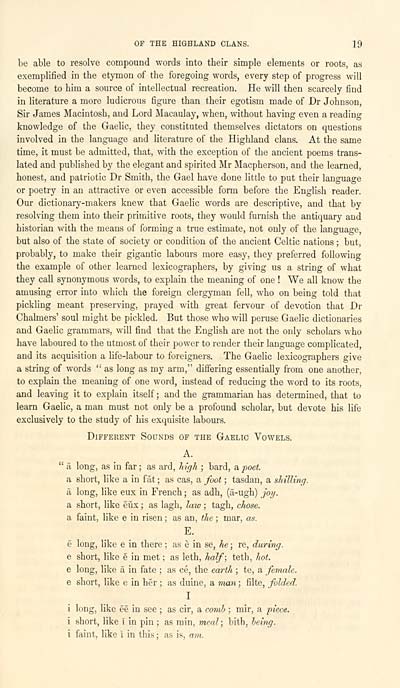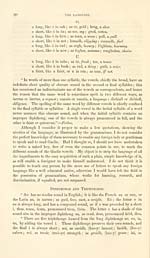Download files
Complete book:
Individual page:
Thumbnail gallery: Grid view | List view

OF THE HIGHLAND CLANS. 19
be able to resolve compound words into their simple elements or roots, as
exemplified in the etymon of the foregoing words, every step of progress will
become to him a source of intellectual recreation. He will then scarcely find
in literature a more ludicrous figure than their egotism made of Dr Johnson,
Sir James Macintosh, and Lord Macaulay, when, without having even a reading
knowledge of the GaeHc, they constituted themselves dictators on questions
involved in the language and literature of the Highland clans. At the same
time, it must be admitted, that, with the exception of the ancient poems trans-
lated and published by the elegant and spirited Mr Macpherson, and the learned,
honest, and patriotic Dr Smith, the Gael have done little to put their language
or poetry in an attractive or even accessible form before the English reader.
Our dictionaiy-makers knew that Gaelic words are descriptive, and that by
resolving them into their primitive roots, they would furnish the antiquary and
historian with the means of forming a true estimate, not only of the language,
but also of the state of society or condition of the ancient Celtic nations ; but,
probably, to make their gigantic labours more easy, they preferred following
the example of other learned lexicographers, by giving us a string of what
they call synonymous words, to explain the meaning of one ! We all know the
amusing error into which the foreign clergyman fell, who on being told that
pickling meant preserving, prayed with great fervour of devotion that Dr
Chalmers' soul might be pickled. But those who will peruse Gaelic dictionaries
and Gaelic grammars, will find that the English are not the only scholars who
have laboured to the utmost of their power to render their language complicated,
and its acquisition a life-labour to foreigners. The Gaelic lexicographers give
a string of words '" as long as my arm," differing essentially from one another,
to explain the meaning of one word, instead of reducing the word to its roots,
and leaving it to explain itself ; and the grammarian has determined, that to
learn Gaelic, a man must not only be a profound scholar, but devote his life
exclusively to the study of his exquisite labours.
Different Sounds of the Gaelic Vowels.
A.
" a long, as in far ; as ard, high ; bard, a poet.
a short, like a in fat ; as cas, a foot ; tasdan, a shilling.
a long, like eux in French ; as adh, (a-ugh) jo>/.
a short, like eux ; as lagh, law ; tagh, chose.
a faint, like e in risen ; as an, the ; mar, as.
E.
è long, like e in there ; as è in se, he ; re, during.
e short, like è in met ; as leth, half; teth, hot.
e long, like a in fate ; as ce, the earth ; te, a female.
e short, like e in her ; as duine, a man ; filte, folded.
I
i long, like èè in see ; as cir, a comh ; mir, a piecs.
i short, like i in pin ; as min, meni; bith, heing.
i faint, like ì in this ; as is, am.
be able to resolve compound words into their simple elements or roots, as
exemplified in the etymon of the foregoing words, every step of progress will
become to him a source of intellectual recreation. He will then scarcely find
in literature a more ludicrous figure than their egotism made of Dr Johnson,
Sir James Macintosh, and Lord Macaulay, when, without having even a reading
knowledge of the GaeHc, they constituted themselves dictators on questions
involved in the language and literature of the Highland clans. At the same
time, it must be admitted, that, with the exception of the ancient poems trans-
lated and published by the elegant and spirited Mr Macpherson, and the learned,
honest, and patriotic Dr Smith, the Gael have done little to put their language
or poetry in an attractive or even accessible form before the English reader.
Our dictionaiy-makers knew that Gaelic words are descriptive, and that by
resolving them into their primitive roots, they would furnish the antiquary and
historian with the means of forming a true estimate, not only of the language,
but also of the state of society or condition of the ancient Celtic nations ; but,
probably, to make their gigantic labours more easy, they preferred following
the example of other learned lexicographers, by giving us a string of what
they call synonymous words, to explain the meaning of one ! We all know the
amusing error into which the foreign clergyman fell, who on being told that
pickling meant preserving, prayed with great fervour of devotion that Dr
Chalmers' soul might be pickled. But those who will peruse Gaelic dictionaries
and Gaelic grammars, will find that the English are not the only scholars who
have laboured to the utmost of their power to render their language complicated,
and its acquisition a life-labour to foreigners. The Gaelic lexicographers give
a string of words '" as long as my arm," differing essentially from one another,
to explain the meaning of one word, instead of reducing the word to its roots,
and leaving it to explain itself ; and the grammarian has determined, that to
learn Gaelic, a man must not only be a profound scholar, but devote his life
exclusively to the study of his exquisite labours.
Different Sounds of the Gaelic Vowels.
A.
" a long, as in far ; as ard, high ; bard, a poet.
a short, like a in fat ; as cas, a foot ; tasdan, a shilling.
a long, like eux in French ; as adh, (a-ugh) jo>/.
a short, like eux ; as lagh, law ; tagh, chose.
a faint, like e in risen ; as an, the ; mar, as.
E.
è long, like e in there ; as è in se, he ; re, during.
e short, like è in met ; as leth, half; teth, hot.
e long, like a in fate ; as ce, the earth ; te, a female.
e short, like e in her ; as duine, a man ; filte, folded.
I
i long, like èè in see ; as cir, a comh ; mir, a piecs.
i short, like i in pin ; as min, meni; bith, heing.
i faint, like ì in this ; as is, am.
Set display mode to: Large image | Transcription
Images and transcriptions on this page, including medium image downloads, may be used under the Creative Commons Attribution 4.0 International Licence unless otherwise stated. ![]()
| Early Gaelic Book Collections > Blair Collection > Treatise on the language, poetry, and music of the Highland clans > (31) |
|---|
| Permanent URL | https://digital.nls.uk/76236744 |
|---|
| Description | A selection of books from a collection of more than 500 titles, mostly on religious and literary topics. Also includes some material dealing with other Celtic languages and societies. Collection created towards the end of the 19th century by Lady Evelyn Stewart Murray. |
|---|
| Description | Selected items from five 'Special and Named Printed Collections'. Includes books in Gaelic and other Celtic languages, works about the Gaels, their languages, literature, culture and history. |
|---|

